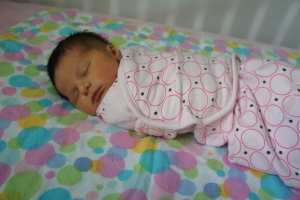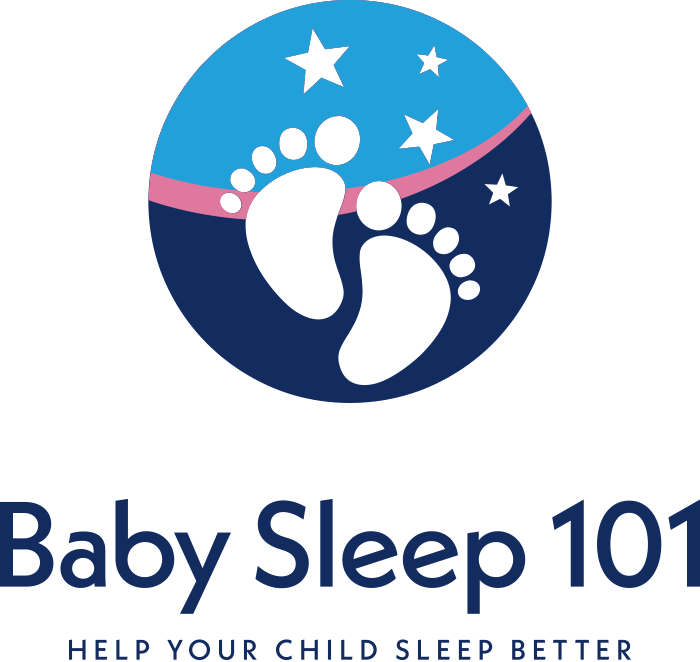Help Your Newborn Nap Without Being Held; 7 Tricks To Try
Helping a newborn nap anywhere other than a parent’s arms, is one of the most asked questions I hear from new parents. They are always keeping their eyes peeled for anything that helps their little one sleep well. They know it’s what’s best for baby – and of course, much better for them, too.
So what happens when they discover their newborn will only sleep in mommy or daddy’s arms? When they transfer her to the crib or another more permanent sleep location, she wakes right up, which results in the dreaded mini-naps. We know that with parenthood comes sacrifices, but showering and using the washroom shouldn’t be some of them.
If this is you, don’t worry! You’re not alone, and like so many new adventures (and misadventures) in your baby’s young life, it won’t last forever. Newborns move from periods of light and deep sleep very quickly. Thankfully, as your little one closes in on four months old or so, her nap periods will become longer.
But you don’t have to wait that long. You will be able to enjoy basic hygiene rituals once again.
Newborn Nap Tricks
For now? Don’t give up! You’ve still got options – it’s absolutely worth giving these a try:
1. Watch baby’s wake time. Keep it very short! Newborns can only handle 45 minutes to 1.5 hours of being awake before needing another nap or bedtime. For more specific wake times by month, see this info-graphic.
2. Offer a pacifier. When you notice him start to become drowsy, it can provide a soothing distraction.
3. Swaddle your little one. Moms, you can even tuck the swaddle into your shirt or sleep with it overnight first. Then when you swaddle your little one, it has your comforting scent on it, helping your newborn nap easier out of your arms. (When swaddling, leave room for your baby’s knees to bend and their legs to sprawl open a bit. A solid guideline is to leave room for two of your fingers between the baby’s chest and the cloth. And when you see your baby begin to try to roll , it is time to immediately ditch the swaddle. Do not wait for them to actually complete it. )
Struggling with your newborn’s naps? Get even more tips, routine suggestions, and solutions, in the Newborn Nap Guide ebook.
4. Hold the baby for about 15-20 minutes after he nods off. Then slowly transfer him to his crib or other sleeping location, moving slowly as to not induce the moroz reflex. This all allows for deeper sleep.
5. Safe sleep is sound sleep. Follow the ABCs of safe sleep to help you rest easy. Baby should be Alone, on their Back, and in a Crib or bassinet. There should be no bumpers, toys, pillows, blankets, positioners or baby nests, (yes, that includes products such as Dock-a-Tots). The crib should be empty other than a tightly fitting mattress sheet. This is the most safest sleep environment for your baby, which will help you have peace of mind.
6. Create a peaceful environment in your baby’s bedroom. White noise, a dark room to make the most of your child’s melatonin release can all prove helpful. It’s a myth that it can be helpful to get your baby used to napping in a brightly lit room. At first your new baby *will* nap anywhere, but as she begins to produce her own melatonin, it will be important for her biological systems that she naps in a dark room. This will help to encourage long naps. Adding white noise at a moderate volume, keeps her in slumberland even when the dog barks or her older sibling comes home from school.
7. Create a warm and cozy sleep surface. If you feel that the sheets are too cool and possibly waking your newborn up, warm them up before placing her down. You might even decide to lay a hot water bottle on the crib mattress to warm it up, but make sure it’s just warm and not hot, and remove it before you lay your baby down. Remember, your baby’s skin is more sensitive than yours.
When to ask your doctor…
If your baby is waking and crying after being put down, is experiencing poor weight gain, is spitting up or arching, making clicking sounds when drinking, pulling off the breast or bottle and crying, it might be time to ask your doctor if there could be anything wrong. Two common reasons are due to reflux and/or trouble transferring breast or formula milk due to a tongue or lip tie. If you’re feeling worried, the good news is that these two problems are easily remedied by experienced professionals.
No matter which tips or tricks you decide to try, know that your little one is obviously feeling a close bond with you these days, and that’s something to celebrate. In the meantime though, make it a priority to make naps (and life) a little more comfortable for you both.
Need more newborn nap help?
There’s a mouthful! But if you’re needing more tips to try, join Baby Sleep 1o1’s Facebook page for weekly Q and A sessions.





